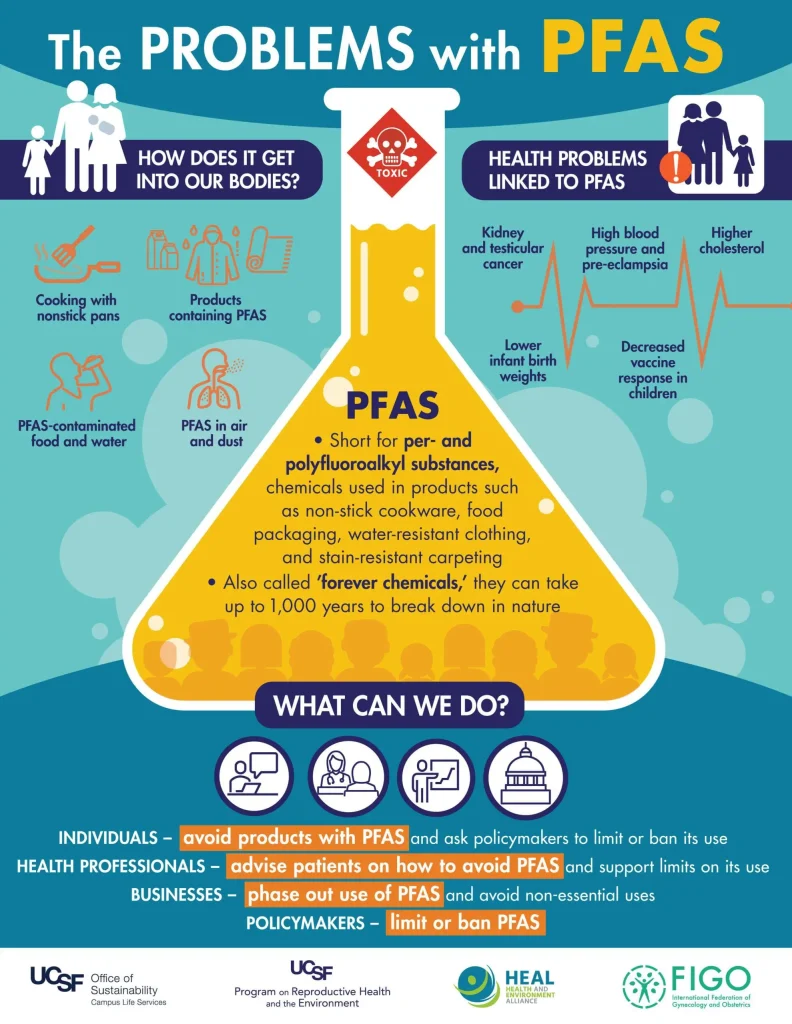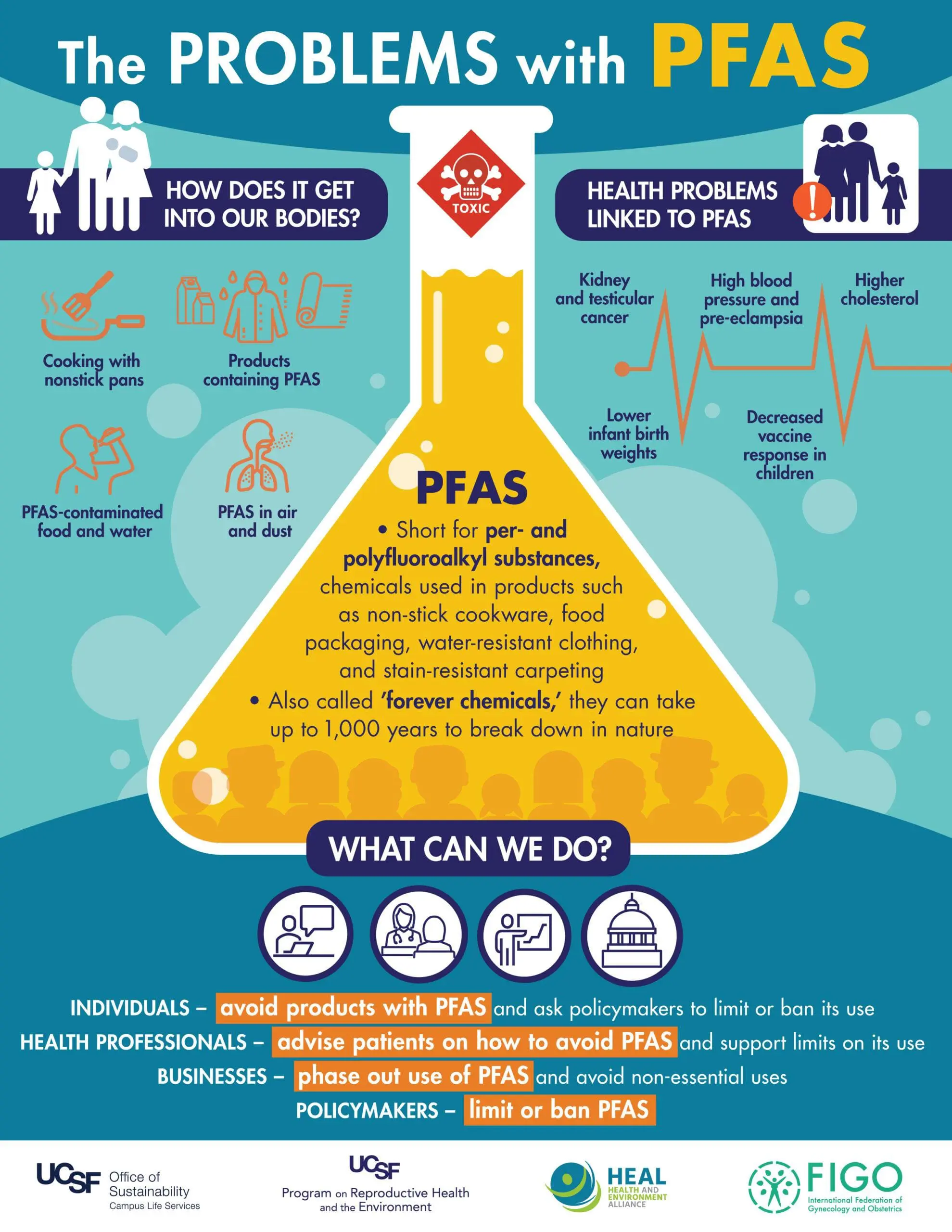Implications Of Recent Court Rulings In PFAS Mass Tort Lawsuit
August 26, 2024 by Susan MohrBackground On PFAS Mass Tort Lawsuits
Per- and polyfluoroalkyl substances (PFAS) are a group of man-made chemicals widely used in various industrial applications and consumer products, such as non-stick cookware, water-repellent fabrics, and firefighting foams. Due to their persistence in the environment and human body, PFAS are often called “forever chemicals.” Over the past few decades, scientific research has increasingly linked PFAS exposure to numerous adverse health effects, including cancer, liver damage, immune system dysfunction, and developmental issues.

As awareness of these risks has grown, so too has the volume of litigation against manufacturers and users of PFAS. Mass tort lawsuits have been filed by individuals and communities who allege that their health was compromised due to exposure to contaminated water supplies or other environmental mediums. These lawsuits seek compensation for medical expenses, property devaluation, and punitive damages. The complexity of these cases arises from the widespread nature of PFAS contamination and the challenge of proving direct causation between specific sources of PFAS emissions and individual health outcomes.
As courts navigate these intricacies, recent rulings are beginning to set important precedents that could shape future litigation strategies and regulatory policies concerning PFAS.
Overview Of Recent Court Rulings
In recent years, the legal landscape surrounding per- and polyfluoroalkyl substances (PFAS) has undergone significant transformation due to a series of pivotal court rulings. These rulings have set critical precedents influencing ongoing and future mass tort lawsuits related to PFAS contamination. One landmark decision came from the U.S. District Court for the District of South Carolina, which has been central in consolidating numerous PFAS-related cases into multidistrict litigation (MDL).
This consolidation aims to streamline pretrial proceedings and foster consistency in judicial decisions.
Another vital ruling emerged when a federal judge allowed claims for medical monitoring costs to proceed, even in cases where plaintiffs had not yet shown symptoms of illness but had demonstrable exposure to PFAS. This decision underscores the courts’ recognition of these substances’ potential long-term health risks.
Additionally, some state courts have started holding manufacturers liable for widespread environmental damage caused by PFAS, further broadening the scope of accountability beyond personal injury claims. These recent court actions collectively reflect a growing judicial acknowledgment of PFAS’s pervasive impact on public health and the environment, setting influential benchmarks for future litigation and regulatory measures.
Impact On Environmental Contamination
Recent court rulings in the PFAS mass tort lawsuit have far-reaching implications for environmental contamination management and accountability. These rulings underscore the legal responsibilities of corporations that have historically discharged per- and polyfluoroalkyl substances (PFAS) into the environment, contributing to widespread contamination of water supplies and ecosystems. By holding these entities accountable, courts are setting a precedent that could drive stricter regulatory oversight and incentivize better corporate practices regarding chemical waste disposal.
Moreover, the increased legal scrutiny has prompted companies to invest more in pollution control technologies and remediation efforts. This shift is crucial for mitigating future contamination risks and protecting public health. Additionally, these rulings may accelerate research into alternative, less harmful chemicals, thereby reducing reliance on PFAS compounds known for their persistence in the environment.
Due to these legal developments, communities affected by PFAS contamination will likely see more robust cleanup efforts. Financial settlements from lawsuits could fund extensive environmental restoration projects, leading to cleaner water sources and healthier ecosystems. Recent court decisions are pushing stakeholders towards greater environmental stewardship and sustainable practices.
Health Risks Associated With PFAS Exposure
Per- and polyfluoroalkyl substances (PFAS) have garnered significant attention due to their pervasive presence in the environment and potential health risks. Recent court rulings in PFAS mass tort lawsuits underscore the gravity of these concerns as evidence mounts regarding the adverse health impacts associated with exposure to these “forever chemicals.” PFAS persist in the human body and environment for extended periods, leading to bioaccumulation.
Studies link prolonged exposure to PFAS with various serious health issues.
One of the most alarming associations is between PFAS exposure and cancer. Specifically, kidney and testicular cancers have been observed at higher rates among individuals with significant PFAS levels. Additionally, these chemicals are implicated in immune system dysfunction, potentially reducing vaccine efficacy and increasing susceptibility to infections. Liver damage is another concern; elevated liver enzymes suggest hepatic stress or injury.
Moreover, PFAS exposure has been connected to developmental issues in fetuses and infants, including low birth weight and skeletal variations. Endocrine disruption is also critical, as it can lead to hormonal imbalances affecting reproductive health. The recent court rulings highlight these risks, emphasizing the need for stringent regulatory measures and greater public awareness of PFAS-related hazards.
Cancer Risk Assessment In PFAS Cases
The assessment of cancer risks in PFAS (per- and polyfluoroalkyl substances) cases has emerged as a crucial element in recent court rulings, significantly influencing the trajectory of mass tort lawsuits. As scientific research increasingly underscores the potential carcinogenic properties of certain PFAS compounds, courts have begun to scrutinize the methodologies used to establish causation between PFAS exposure and cancer development. This involves complex epidemiological studies and toxicological analyses that aim to quantify exposure levels and assess their correlation with cancer incidences.
Expert testimonies play a pivotal role in these legal battles. Plaintiffs rely on specialists who can demonstrate that prolonged exposure to PFAS, often through contaminated water supplies or occupational settings, has led to elevated cancer risks. Conversely, defendants challenge these assertions by questioning the reliability of scientific data and highlighting uncertainties in risk assessment processes.
Recent rulings reflect a growing judicial recognition of the substantive evidence linking PFAS with various cancers, such as kidney and testicular cancers. Courts are increasingly willing to consider nuanced scientific arguments about dose-response relationships and latency periods, thus shaping how future PFAS-related cancer claims will be adjudicated. This evolving landscape underscores the necessity for rigorous scientific inquiry within legal frameworks when addressing public health concerns associated with toxic substances like PFAS.
Water Contamination Issues Addressed By Court Rulings
Recent court rulings in the PFAS mass tort lawsuit have significantly addressed water contamination issues, underscoring the pervasive impact of these chemicals on public health and the environment. Per- and polyfluoroalkyl substances (PFAS) are synthetic chemicals widely used in various industrial applications and consumer products, notorious for their persistence in the environment and the human body. The court’s decisions have acknowledged the substantial evidence linking PFAS contamination to adverse health effects, such as cancer, liver damage, and immune system dysfunctions.
One pivotal aspect highlighted by these rulings is the responsibility of manufacturers and corporations in preventing environmental contamination. The courts have scrutinized corporate practices related to waste disposal and chemical management, emphasizing the need for stringent regulatory compliance to protect water sources. Moreover, these rulings have stressed the importance of transparency and public disclosure regarding potential risks associated with PFAS exposure.
In addressing water contamination issues, courts have also mandated comprehensive testing and monitoring programs to identify affected areas accurately. This judicial oversight ensures that mitigation efforts are effectively implemented, safeguarding communities from further exposure while holding those responsible for environmental degradation accountable.
Implications For Future Toxic Chemicals Litigation
The recent court rulings in the PFAS mass tort lawsuit hold significant implications for future toxic chemicals litigation, potentially reshaping legal strategies and regulatory landscapes. One of the most profound impacts is the precedent set for establishing liability and causation in complex environmental cases. Courts’ willingness to accept broader scientific evidence linking PFAS exposure to adverse health effects paves the way for similar approaches in future cases involving other toxic substances.
Moreover, these rulings underscore the importance of corporate transparency and accountability. Companies may face heightened scrutiny regarding their disclosure practices and historical knowledge of chemical risks. This could lead to more stringent regulatory requirements and proactive measures by corporations to mitigate potential liabilities.
Additionally, plaintiffs’ success in PFAS litigation may encourage more individuals and communities affected by toxic exposures to seek legal redress, amplifying public awareness and advocacy efforts. This shift could prompt legislative bodies to revisit existing environmental laws and regulations, aiming for more robust protections against emerging contaminants.
In essence, these court decisions influence immediate outcomes and set a transformative trajectory for how future toxic chemical litigations are approached, adjudicated, and resolved.
Mohr Marketing is currently running PFAS campaigns. Get started before your competitors do … We can only onboard a certain number of clients.
CONTACT US FOR A QUOTE. CALL 866-695-9058 OR USE OUR REQUEST A QUOTE FORM.
Susan Mohr
Mohr Marketing, LLC
CEO and Founder


Recent Posts
- Why Mass Tort Firms Must Own Their Lead Generation
- Stop Buying “Black Box” Leads. It’s Time for a Glass Pipeline.
- New “Joint Advertising & Compliance Program”
Categories
- AI and Lead Generation
- Business Financing
- Call Verified MVA Leads
- Car Accident Help
- Car Accident Settlements
- Claimant Funding
- Compliance Program
- Geotargeting
- Google Maps Ranking
- Healthcare Practice Growth
- Law Firm Growth
- Law Office Operations
- Lead Generation
- Lead Generation For Attorneys
- Lead Generation For Chiropractors
- Lead Generation For Criminal Attorneys
- Lead Generation For D&A Treatment Centers
- Lead Generation For DUI Attorneys
- Lead Generation For Eye Doctors
- Lead Generation For Family Law Practices
- Lead Generation For PI Law Firms
- Lead Generation For Plastic Surgeons
- Leads For Healthcare Professionals
- Leads For Insurance Industry
- Legal Leads
- Legal Marketing
- Legal Updates
- Mass Tort Leads
- Medicare and Medicaid Leads
- Merchant Funding Leads
- Online Marketing Strategies
- Pre-Settlement Funding
- Signed MVA Cases
- Tort Updates
- Truck Accident Settlements
- Web Design
Archives
Copyright © 1994-2025 Mohr Marketing, LLC. All Rights Reserved.


